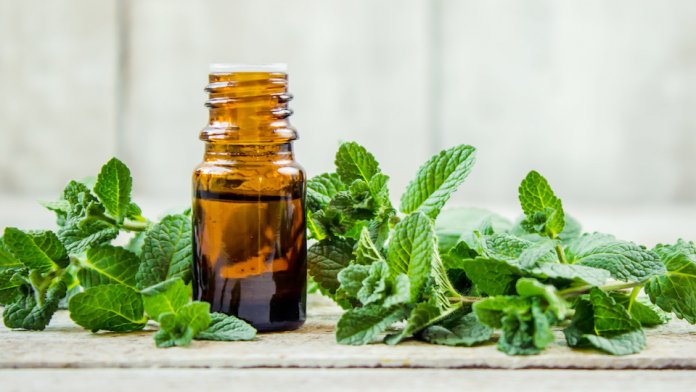I’m so grateful that one of my “happy places” is in my own backyard. We have a lovely little stream back there that is bounded on each side by beautiful old stone walls and a little footbridge we use to get across. And, right there, on the banks of that stream is an equally lovely patch of water-loving peppermint. Here’s a photo that I took of the stream with its peppermint banks. This amazing medicinal plant—a cross between spearmint and water mint—is a well-known folk medicine for soothing stomach aches, but it does a whole lot more too. This article by my team at UpWellness is a great start to learning about the benefits of Mentha piperita…a beautiful, tasty, and medicinal plant.
-JL
Recent studies surrounding the effects of peppermint tea and extracts once again help prove the power of plants. This remarkable herb is easy to grow, hardy, and could relieve several conditions, including digestive upset and mental fatigue. If you don’t have a pot of peppermint growing in your windowsill, you’re missing out. Read on for our favorite benefits of peppermint and how to use it to boost your health.
Relieve headaches
Peppermint oil contains menthol, a potent substance known for increasing blood flow and delivering a pleasant, cooling sensation that works to relieve pain. One randomized, placebo-controlled clinical study of 35 people with persistent migraines showed that peppermint oil, applied to the forehead and temples, significantly reduced pain over two hours.
Help you feel more alert
Ditch those sugary, caffeinated drinks and reach for another, healthier pick-me-up when you’re starting to feel sluggish at work. A study from Wheeling Jesuit University has linked peppermint to an increase in awareness, alertness, mental performance, productivity, and motivation. Since peppermint serves as a central nervous system stimulant, these effects are not surprising. Keep a bottle of peppermint essential oil in your purse or at your desk and take a deep whiff anytime you feel yourself struggling to stay awake. You can also use a diffuser for extended aromatherapeutic benefits.
Improve indigestion
According to numerous studies, including one from the University of Maryland Medical Center, peppermint is incredibly beneficial for soothing an irritated digestive tract. It can calm down an inflamed bowel by increasing the production of stomach bile and can help alleviate gas, bloating, and diarrhea. Follow your meal with a warm cup of peppermint tea if you frequently experience stomach issues after you eat.
Kill bacteria
Like many herbs and essential oils, peppermint is loaded with antibacterial benefits. It can kill E. coli, Listeria, and Salmonella in certain situations and may even help reduce your chances of developing a respiratory disease such as pneumonia.
Help concentration
Not only could peppermint oil help keep you alert and improve productivity, but it could also help keep you focused and allow you to concentrate on mentally taxing tasks. One study of 24 young participants showed that the group that was given a dose of peppermint performed significantly better on cognitive tests than the control group. Drink a glass of tea or take a whiff of peppermint oil before your next big test or presentation.
Soothe menstrual cramps
Peppermint works wonders for any stomach related ailments, including menstrual cramps. It can ease constricted muscles, relieve pain, and the warmth of tea can also calm other premenstrual symptoms. Drink a few glasses every day in the week leading up to and during your period.
Reduce bad breath
Chew on a fresh peppermint leaf after you eat to rid your mouth of the post-meal breath and clean and freshen your teeth. Plus, peppermint can help prevent cavities by decreasing dental plaque, killing germs, and boosting your gum health. Simply chew on the leaves or make your own mouth rinse with food-grade peppermint oil.
Improve clogged sinuses
Menthol is particularly effective at loosening clogged mucus and providing relief during a cold or flu. Additionally, peppermint tea has antibacterial, antiviral, and anti-inflammatory properties that could aid your immune system in fighting off infectious upper respiratory illnesses that hamper nasal airflow.
Forms of peppermint:
- Enjoy peppermint leaves, fresh or dried, in a cup of tea.
- Use peppermint essential oil for aromatherapy, in lotion, chest rubs, or tinctures.
- Take in capsule form as a supplement for digestive issues
Remember, never apply pure essential oil directly to the skin. Always dilute it in a carrier oil such as sweet almond or coconut oil before using it.
Note: If you are on any prescription medications, it is a good idea to consult with your doctor before beginning peppermint supplementation as it could have adverse interactions.
How do you use peppermint for your health? Let us know in the comments below!
-The UpWellness Team


